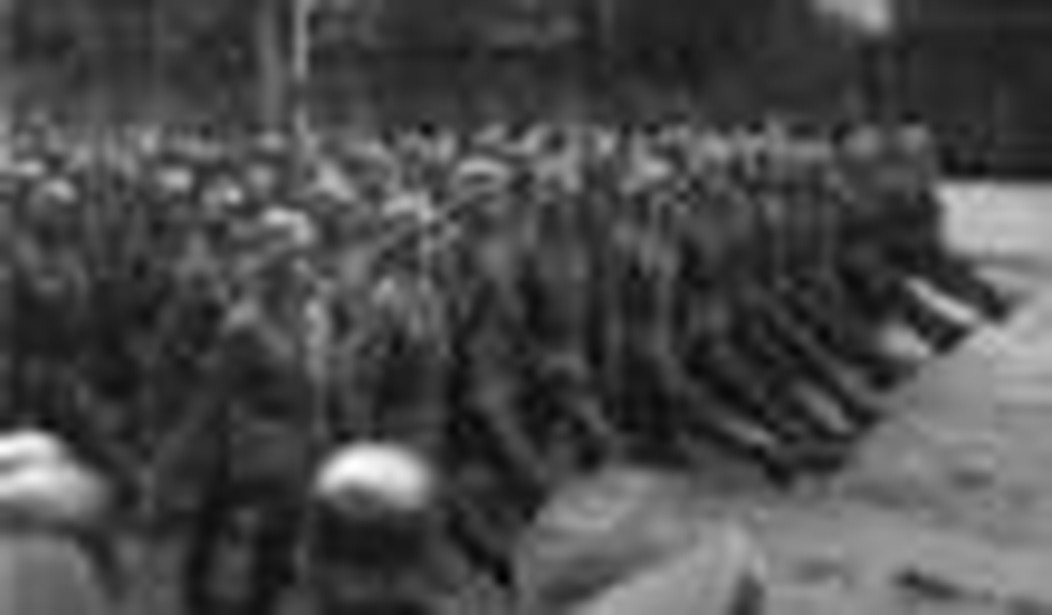In his new book, Human Smoke (New York: Simon and Schuster), Nicholson Baker gives this account of the views of Mohandas K. Gandhi in November 1938: “Even if the Allies were to go to war against Germany, Gandhi said, their action could bring to the Jews no inner joy or strength. Inner joy came from suffering voluntarily forgone.”
Baker is an accomplished novelist, but remarkably, his account of Gandhi’s views is not fictional. Baker moreover sees nothing wrong in them; and this is more remarkable still. So far as I can work out from my own conversations with an admittedly very limited sample of those who witnessed the Nazis’ racial policies, the number of European Jews who secured inner joy from their experience of ghettos, cattle trains, and gas chambers was zero.
Human Smoke purports to be a historical account of the political and social origins of WWII, drawn mainly from primary sources. If you imagine that primary sources equate to original research, then think again. Baker’s sources are not the records of statecraft. They are predominantly newspaper cuttings, shorn of context and confined entirely to English-language publications. It is an understatement to say that Baker lacks a historian’s interpretative ability to make sense even of these.
The resulting farrago neatly and with deliberation indicts political leaders of whatever power, and sentimentalizes the voices of those who opposed war. Human Smoke is a trivial, tendentious, ignorant, and more than moderately disgusting work dedicated to the proposition that the pacifist campaigners of the 1930s were heroes of the era. “They failed,” writes Baker in his concluding sentence, “but they were right.”
The most generous thing you can say about Baker’s thesis is that it is not of his own devising. It is a startlingly hackneyed restatement of the popular notion that: “Great armaments lead inevitably to war. The increase of armaments … produces a consciousness of the strength of other nations and a sense of fear.”
Those words are not Baker’s. They were written in 1925 by Sir Edward Grey, British Foreign Secretary at the outbreak of WWI. Grey’s view exercised a powerful influence on British diplomacy in the inter-war years. The tragedy is that it was wrong.
It is not true that arms races inevitably lead to war. (The rivalry of the late nineteenth century, whereby France and Russia challenged British naval supremacy, concluded with the Entente Cordiale of 1904 and the Anglo-Russian Convention of 1907.) It was not true that the British-German naval arms race of the early twentieth century led to WWI. (Great Britain entered WWI under a Liberal Government that, after its landslide election victory of 1906, had in fact sought international disarmament under the auspices of the Second Hague Conference.) Above all, it was catastrophically untrue that arms competition and the interests of big business, rather than the imperialist designs of the Axis powers, led to WWII.
In the absence of serious historical scrutiny, Baker offers Manichean counterpoint. Churchill and Roosevelt are fingered for having made sly (and sometimes not so sly) antisemitic insinuations. Pacifist campaigners, on the other hand, “tried to save Jewish refugees, feed Europe, reconcile the United States and Japan, and stop the war from happening.”
There was in reality a far from trivial overlap between the organized peace movement and pro-German sympathizers. The chairman of the Peace Pledge Union (the principal pacifist body in Britain), Canon Stuart Morris, held membership in the antisemitic and pro-Nazi organization known as The Link. The popular novelist and prominent America First speaker Kathleen Norris lauded the patently racist Charles Lindbergh as “America’s Joan of Arc”. (Baker cites a few American pacifist campaigners, but prudently if conspicuously omits that one.)
Baker’s quixotic thesis has been widely dismissed by reviewers, but not in my view with sufficient derision. There is an instructive parallel here with the work of Baker’s most favorable reviewer, the popular author Mark Kurlansky. Writing in the Los Angeles Times, Kurlansky marveled: “It may be one of the most important books you will ever read. It could help the world to understand that there is no Just War, there is just war — and that wars are not caused by isolationists and peaceniks but by the promoters of warfare.”
Kurlansky’s byline notes his own related book Nonviolence: 25 Lessons From the History of a Dangerous Idea, which was respectfully and even generously reviewed on publication in 2006. When Kurlansky came to London to promote it, I debated his thesis with him on a television news program. I pointed out that, in rubbishing the notion that the struggle against Nazism was a just war, Kurlansky had taken one part of his argument directly from the discredited work of the Holocaust denier David Irving.
Kurlansky was visibly upset by my comment, but I was right. The point at issue was Kurlansky’s claim (p. 141 of his book) that “historians estimate that between 100,000 and 130,000 people” died in the Allied bombing of Dresden. They do not: they estimate the true figure at around 25,000-30,000. As the judge in the David Irving libel case of 2000, Mr Justice Gray, succinctly observed: “In my judgment the estimates of 100,000 and more deaths which Irving continued to put about in the 1990s lacked any evidential basis and were such as no responsible historian would have made.”
Neither Baker nor Kurlansky is a historian, let alone a responsible one. The only interesting aspect of their writing is how easily protesters against war can assimilate the mythology of those who are not anti-war, but anti-American and anti-British.
Oliver Kamm is an author and Times columnist. His blog is available here.








Join the conversation as a VIP Member